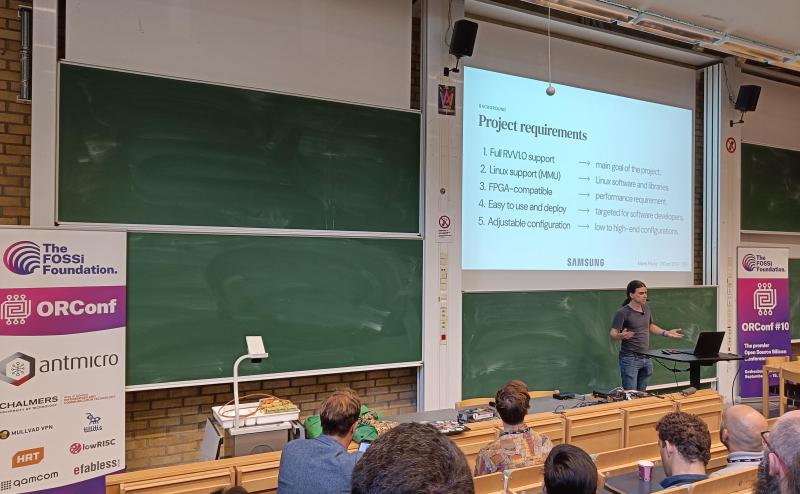ORConf holds a special place in my heart, and this year marked my second time attending. Last year, I gave a lightning talk, which was a great experience (you can check it out here!). This year, I was excited to return, this time with both a full 15-minute presentation and another lightning talk. It was a fantastic opportunity to share what I’ve been working on and connect with other engineers and open-source enthusiasts. Hopefully, this will become a tradition 😄
General Overview
Before diving into the details of my talks, let’s talk about the event itself. ORConf 2024 took place in Gothenburg, Sweden, from September 13th to 15th. It was exciting to see that attendance significantly increased this year. Let’s hope to keep that momentum going for open silicon in the coming years!
The conference followed a single-track format with 31 talks, along with an additional lightning talk session featuring 15 submissions, and an unconference on Sunday, which included five workshop tracks. ORConf is organized by the FOSSi Foundation, a non-profit dedicated to fostering community and innovation in Free and Open Source Silicon. Besides ORConf, the FOSSi Foundation also organizes the annual LatchUp conference in the USA.
While the primary focus of ORConf is on chip design, there were a few software-related talks as well, including mine. Topics ranged from RISC-V, open-source EDA tools, verification (cocotb FTW), and modern HDLs, with great representation from nearly all “new” HDLs: SpinalHDL, Chisel, Clash, DFHDL, Amaranth, and Spade.
In general, I highly recommend browsing through the list of talks and picking out the ones that catch your interest – you won’t be disappointed! There was also a lightning talk session, and a video has already been posted on the FOSSi YouTube channel (complete with chapter markers for each topic). Huge kudos to the organizers for getting the videos online just hours after the talks wrapped up!
My RVV Talk
For the past year, my work at Samsung R&D Institute Poland has primarily focused on RISC-V Vector (RVV) development. My talk at ORConf centered around the process of enabling hardware-accelerated RVV software development, which I also discussed in my RISC-V Summit Europe 2024 poster.
It’s amazing to see how the open-source RISC-V IP core ecosystem has evolved over the past year. When I started creating the FPGA-based platform for RVV software development earlier this year, my options were limited. The only viable choice at the time was PULP Ara, a vector coprocessor for the well-known CVA6 processor from OpenHW Group.
Now, the landscape looks very different. PULP Ara has seen significant improvements over the last few months, fixing most of the bugs I encountered. Additionally, we now have more high-quality RVV coprocessors available. One example is the Saturn Vector Unit, which was presented at ORConf this year by Jerry Zhao from UC Berkeley. If I’d had access to this six months ago, my project would have been a walk in the park!
In my opinion, a platform that prides itself on being open should provide open reference implementations during the ratification process.
The point is that RVV was ratified in November 2021, but it took nearly three years for the RISC-V community to gain access to quality open-source RVV-capable cores. In my opinion, a platform that prides itself on being open should provide open reference implementations during the ratification process. It feels like the RISC-V ISA specification is created by hardware people, for other hardware people, without adequately considering the needs of software developers. There seems to be an expectation that the open-source software community will step in and offer first-class support for new ISA extensions. But how can that happen if these developers don’t have access to real hardware in time?
Alright, enough ranting. I encourage you to watch my talk and let me know if you found the insights valuable. All project materials are available on my GitHub (additional links: extended abstract, poster, slides).
Multiplatform CI Pipeline Lightning Talk
Besides my main talk, I also gave a lightning talk about my recent work on overhauling the CI pipeline for the pixman project. In this short presentation, I explained my approach to multiplatform CI in GitLab, which leverages Debian as the base OS, given its fantastic support for a wide range of platforms. I also used Docker in tandem with QEMU to seamlessly emulate all the platforms supported by pixman.
You can check out the pipeline description here and see the execution in action here. The slides from my lightning talk are also available on my GitHub.
See you next year at ORConf! 👋
